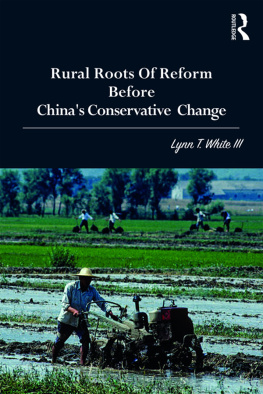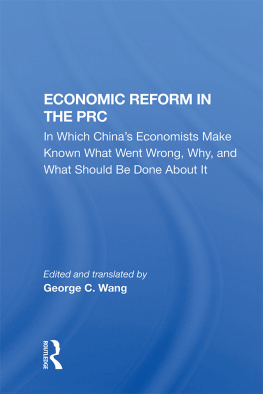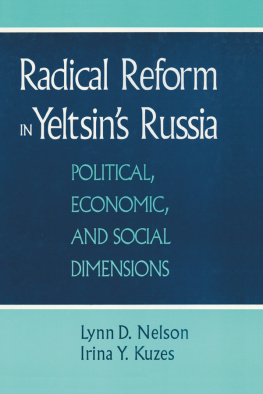First published 2018
by Routledge
2 Park Square, Milton Park, Abingdon, Oxon OX14 4RN
and by Routledge
711 Third Avenue, New York, NY 10017
Routledge is an imprint of the Taylor & Francis Group, an informa business
2018 Lynn T. White III
The right of Lynn T. White III to be identified as author of this work has been asserted by him in accordance with sections 77 and 78 of the Copyright, Designs and Patents Act 1988.
All rights reserved. No part of this book may be reprinted or reproduced or utilized in any form or by any electronic, mechanical, or other means, now known or hereafter invented, including photocopying and recording, or in any information storage or retrieval system, without permission in writing from the publishers.
Trademark notice: Product or corporate names may be trademarks or registered trademarks, and are used only for identification and explanation without intent to infringe.
British Library Cataloguing-in-Publication Data
A catalogue record for this book is available from the British Library
Library of Congress Cataloging-in-Publication Data
Names: White, Lynn T., III, 1941 author.
Title: Rural roots of reform before Chinas conservative change / by Lynn T. White III.
Description: Abingdon, Oxon ; New York, NY : Routledge, 2018. | Includes bibliographical references and index.
Identifiers: LCCN 2017060133 | ISBN 9780815371045 (hbk) | ISBN 9780815371052 (pbk) | ISBN 9781351247696 (ebk)
Subjects: LCSH: Decentralization in governmentChina. | Central-local government relationsChina. | Local governmentChina. | Agriculture and stateChina. | Economic developmentChina. | ChinaPolitics and government 19762002. | ChinaPolitics and government2002
Classification: LCC JQ1509.5.D42 W47 2018 | DDC 320.80951dc23
LC record available at https://lccn.loc.gov/2017060133
ISBN: 978-0-8153-7104-5 (hbk)
ISBN: 978-0-8153-7105-2 (pbk)
ISBN: 978-1-351-24769-6 (ebk)
Typeset in Bembo
by Apex CoVantage, LLC
I could never have done this research without the loving encouragement of my wife, Barbara-Sue White, who has published books about Hong Kong and shared my own experiences there and in Shanghai. The book is dedicated to my teachers. It is likewise dedicated to a younger generation of scholars: my graduate and undergraduate students, including many who are now tenured in our common field. I have learned a great deal from them. The lives of these friends will be affected, for better or worse, by Chinas political development. This book about the roots of Chinese reform, and then its change in reaction to them, should interest many readers.
Warm thanks go to all my helpers, some anonymous and many in a list below, who have read parts of this manuscript or have in various ways improved it. I am especially thankful to Hong Kong University's Centre for Asian Studies, which is now part of the HKU Institute of Humanities and Social Sciences, and to its successive heads Edward Chen, Wong Siu-lun, and Angela Leung. The cover picture was taken near Suzhou in the 1980s. Generous logistical help also came from Priscilla Roberts in Hong Kong. Generous logistical help also came from Priscilla Roberts in Hong Kong. Jimmy Wang, a computer guru in Princetons Woodrow Wilson School, has provided invaluable support over decades for all my projects including this book. My main formal affiliation has been with Princeton, but informally I am still connected to UC Berkeleys Center for Chinese Studies, where long ago I was a graduate student.
Further thanks go to Douglas Merwin, to referees blind and seeing, to Routledge editors Stephanie Rogers, Georgina Bishop, and Luke Allen, as well as copy editor Rodney Williams and project manager Tina Cottone. I am also grateful to Routledge for permission to use material from my 1998 book Unstately Power: Local Causes of Chinas Economic Reforms, which won the Association for Asian Studies prize, named for my former teacher Joseph Levenson, as the best book of its year concerning twentieth-century China. From this later viewpoint of 2018, it is clear that much of Chinas politics in the new century has been a centralist reaction to the partial localization of power that book described. The dynamics of this change now call for some revision of the nearly existential tendency to treat politics as central in China (Zhongguo). I hope that Chinese and Western readers who have used that normal discourse are not so offended by my expansion of it that they think I am rejecting it wholly. I appreciate their work too and am only suggesting more attention to local politics that has sometimes been very powerful because large numbers of local Chinese leaders faced similar unintended contexts and acted in parallel with each other.
I also thank many wonderful colleagues who recently or long ago provided pointers to literature, to people I consulted, or to other ways for improving this book: Michael Agelasto, David Bachman, Joseph Bosco, John P. Burns, Chai Ling, Chan Kam-wing, Chan Man-hung, Chen Dingyue, Chen Haowen, Chen Jing, Chen Shenshen, Chen Yuqun, Chen Xiaoping, Cheng Chaoze, Joseph Cheng, Cheng Kaiming, Cheng Xiaonong, Chiao Chien, Gregory Chow and Paula Chow, Tom Christensen, Donald Clarke, Roger Cliff, Alison Conner, Frank Diktter, Anthony Diller, John Dolfin, Audrey Donnithorne, Joshua Eisenman, Fu Qiangguo, Mary Gallagher, Rick Glofcheski, Julia Gramer, Gu Mingyuan, Guo Xiaolin, Carol Hamrin, Chad Hansen, Norma Harris, Nancy Hearst, He Deyu, Claire Hollingworth, Marlowe Hood, Huan Guocang, Philip C. C. Huang, Hung Shufen, John Kamm, London Kirkendall, Kuah Khun Eng, Y. Y. Kueh, Erik Martnez Kuhonta, H. K. Kwan, Reginald Y. W. Kwok, Lee Chin-chuan, Elida Lee, Lee Ying-fen, Beatrice Leung, C. K. Leung, Li Cheng, Li Wuwei, Li Xiaodong, Li Xuecheng, Liao Nien-fu and Chen Lu-ning, Lin Hao, Lin Lu, Lin Quanshui, Liu Ching-chih, Lu Feiyun, L Zheng, Ma Da, Neysun Mahboubi, Meng Hongwei, Alice L. Miller, Erik Mobrand, Tom Moore, John Norris, Pei Minxin, Peng Dajin, Peng Wen-shien, Judith Polumbaum, Qin Jianxun, Stanley Rosen, Sigrid Schmalzer, David Shambaugh, Shi Qingkai, Shi Qingsheng, Shih Hsiao-yen, Shu Hanfeng, Shu Renqiu, Sia Yin-ching, Ronald Skeldon, Song Jun, Su Chi, Su Songxing, Antony Tatlow, Wang Chongfang, Wang Gungwu, Wang Shaoyun, Xia Jinxiong, Wang Juan, Wang Xu, Philip Wickeri, Adam Williams, Linda Wong, Wong Siu-lun, Wu An-chia, Wu Guoguang, Yang Bucai, Yang Dali, Yang Meirong, Yang Sizheng, Yao Liang, Yao Tinggang, John Yasuda, Yen Chengzhong, Yu Shutong, Zhang Jian, Zhang Linlan, Zheng Yongnian, Zhang Yongwei, Zhang Yue, Zhou Ji, Zhou Jianping, Zhou Ruijin, Zhu Xingqing, Zhuang Ming, Zou Fanyang, and several PRC citizens who prefer not to be listed. Special thanks go to Julie Yuwen Chen of the University of Helsinki, who in 2016 invited me to present an earlier version of this text and to two of my former co-authors on other projects, Kate Xiao Zhou and Cheng Li.







